Did you know that 10 million Americans abuse prescription opioids and 48,006 people died in the United States from opioid overdose in 2020? Opioids are a class of drugs clinically prescribed primarily for analgesic (pain-killing), sedative (sleep-inducing), and antitussive (anti-cough) properties. Therefore, opioids have a high propensity to be abused and can result in fatal overdoses due to their euphoria-inducing and pain-killing properties. If you are thinking about why you need to start looking for opioid treatment programs near you. Read ahead and find out.
Table of Contents
What Are Opioids?
Opioids include oxycodone (OxyContin®), hydrocodone (Vicodin®), codeine, morphine, and many additional medicines that are lawfully available with a prescription. They function by attaching to opioid receptors in your body, which are located in parts of the brain that regulate pain and emotions. While opioids can aid in pain management, they also have the potential for abuse and are occasionally administered improperly.
How Can Opioids Be Abused?
When opioids are introduced into the system, they cause the endorphins (the feel-good hormones) to release into the brain. As the endorphins can cause feelings of pleasure, giving a short-lived euphoria that blocks pain receptors and gives a temporary sense of well-being. Hence, giving the user an incentive to abuse the drug repeatedly. Therefore, opioids are extremely addictive, and anyone who takes opioids is at high risk of developing opioid use disorder.
Opioids are mainly prescribed to treat pain. Here is how a person can abuse prescribed opioids:
- By taking more dosage than advised by the doctor
- Use someone else’s medication
- By taking medicine more times than required
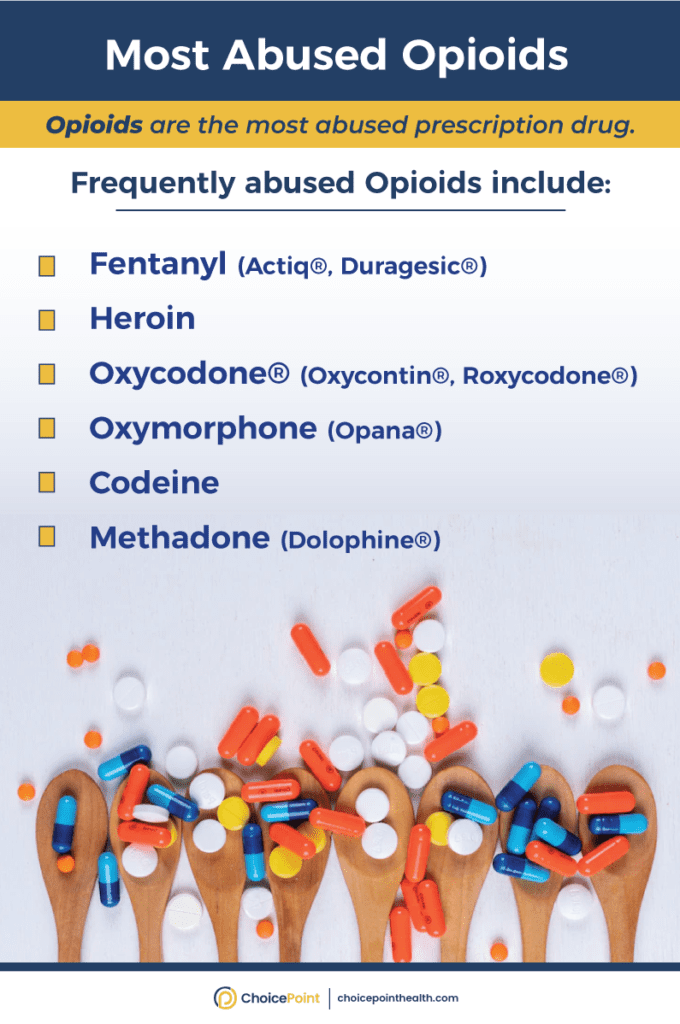
Most Commonly Abused Prescription Opioids
Opioid Use Disorder Requires Urgent Care
Addiction treatment rehabs provide urgent care to people suffering from opioid abuse. Early treatment intervention can help prevent some chronic health issues connected to opiate addiction. Recovery from opioid use disorder is possible if adequate care is provided in time.
Looking for opioid treatment programs near you that use FDA-approved medications in a MAT program to treat opioid addiction? Look no more and contact ChoicePoint at 844.445.2563 now!
What to Expect From an Opioid Treatment Program
When you visit an addiction specialist, they will:
- Assess your medical history
- Review your opioid abuse
- Conduct a physical examination
- Schedule a drug screening test
- Recommend an individualized Opioid addiction treatment program
Opioid Treatment Programs Near You and How It Works
Opioids are one of the most abused prescription drugs. However, early diagnosis and treatment may help reduce some long-term health conditions associated with opioid addiction.
1. MAT (Medication-Assisted Treatment)
Medication-assisted treatment for opioid use disorder is a treatment program that primarily uses FDA-approved medicines to treat addiction to alcohol, opioids, and other prescription drugs. MAT employs a holistic approach to managing patients with Opioid use disorder (OUD), counseling, therapy, behavioral management sessions, and clinically prescribed medications.
2. Medical Detox
Medical Detoxification is defined as the removal of all toxic and addictive chemicals from the body of a person with a history of substance abuse disorder under medical supervision. It is the first step of recovery from substance abuse. Medical detox involves the cessation of opioids and a simultaneous treatment by medications that reverse the physical and psychological effects of opioids. Medical detox is primarily done in rehabilitation centers.
3. Intensive Outpatient Opioid Addiction Treatment
IOP or Intensive Outpatient Addiction Treatment Programs are a type of rehabilitation where patients can visit a rehabilitation center for several hours daily to manage substance misuse disorder (drug addiction). IOPs may last around 15 to 90 days, depending on the severity of your addictions. Unlike traditional rehabilitation programs, Intensive Outpatient programs do not require a patient to be admitted inpatient into the facility. Patients can schedule their visits to the rehab at times they find feasible. However, IOPs are more intensive than other addiction treatment regimens and employ vigorous counseling and social support.
4. Dual Diagnosis Treatment
Opioid addiction may cause more than one mental health disorder in the abuser. The best way to address mental health issues along with addictions is to seek dual diagnosis treatment. A dual diagnosis therapist will provide two types of treatments simultaneously:
- Medical treatments like MAT and Detox
- Therapies like CBT, DBT, and group therapy sessions
5. Medically Assisted Behavioral Therapies
Cognitive behavioral therapy (CBT) may help to treat chronic pains by giving patients an alternative to taking opioids for pain management. The main goal of CBT is to alter the perspective on a problem and eliminate unrealistic or harmful beliefs. That’s how a patient tends to feel differently as a result, and the conduct becomes healthier and more sensible.
Are you or your loved ones using prescribed opioids more than recommended? If yes, then we fear you might be abusing opioids and need to look for opioid treatment programs near you. Don’t wait and call us at 844.445.2563 as you might be at the risk of a fatal overdose!
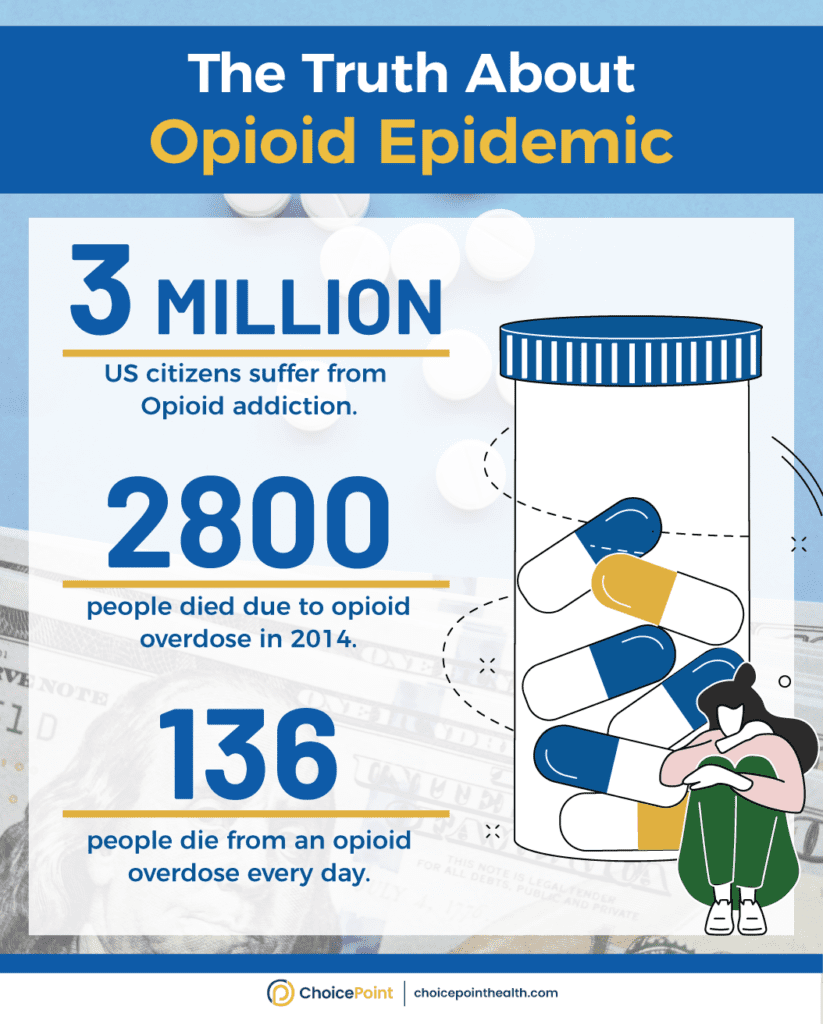
How Fast Is the Opioid Crisis Growing In the US?
What Are the Medications Used in Opioid Addiction Treatment?
Pharmacological treatment of Opioid Addiction involves a plethora of medicines that are used for the management of various aspects of opioid addiction. Some drugs are only used to treat and reverse opioid overdose, while some are additionally effective in substituting potent opioids. Similarly, some opioids are used to wean off patients from more potent opioids.
Some very common drugs used to treat opioid addiction are classified according to their use, as follows:
Management of Opioid Overdose
Management of withdrawal symptoms is equally important, and a separate class of drugs is employed to treat these. Commonly used medications to manage opioid overdose symptoms are:
a) Buprenorphine (BUPRENEX ®)
Buprenorphine® has been majorly used for office-based opioid detoxification and in the treatment and maintenance of management of opioid dependence. It can be given sublingually, through IV, or transdermally.
b) Naloxone (NARCAN®)
Naloxone® is used to reverse coma and respiratory depression due to opioid dependence. It is combined with many opioid drugs to reduce the propensity to be abused.
c) Naltrexone (VIVITROL®)
Naltrexone® works similarly to Naloxone, except it has a more rapid onset detoxification action on opioid overdoses and is used to prevent and reverse opioid-induced respiratory coma.
Management of Opioid Dependence and Addiction
The following medications are commonly used to manage opioid dependence:
a) Suboxone ®
Suboxone® contains Buprenorphine and Naloxone and is the most common medication used to prevent withdrawal symptoms caused by opioids. If opioids are breastmilk, Suboxone® is the formula. Suboxone® is used as a substitute for potent opioids to prevent tolerance and wean patients off of opioid dependence. An example of this is the use of Suboxone® to wean off patients from morphine dependence. Another aspect of the treatment of opioid addiction is withdrawal, which causes physical symptoms like:
- severe nausea
- vomiting
- body pains
- generalized aches
Management of Withdrawal Symptoms
Addiction treatment facilities use the following medications to manage opioid withdrawal symptoms effectively:
a) Clonidine (KAPVAY®) and Lufexidine (LUCEMYRA®)
Clonidine® and Lofexidine® are adrenergic receptor agonists that are used to treat withdrawal symptoms, primarily pain, and cravings.
b) Chlordiazepoxide (LIBRIUM®)
Chlorbenzepoxide® is a Benzodiazepine® used to keep patients calm, anxiety-free, and docile as they go through rehabilitation.
c) Chlorpromazine (THORAZINE®)
Chlorpromazine® is used to treat withdrawal-associated nausea and vomiting.
Opioid addiction requires urgent care at an outpatient opioid treatment center. Contact ChoicePoint at 844.445.2563 as we also offer outpatient opioid treatment programs.
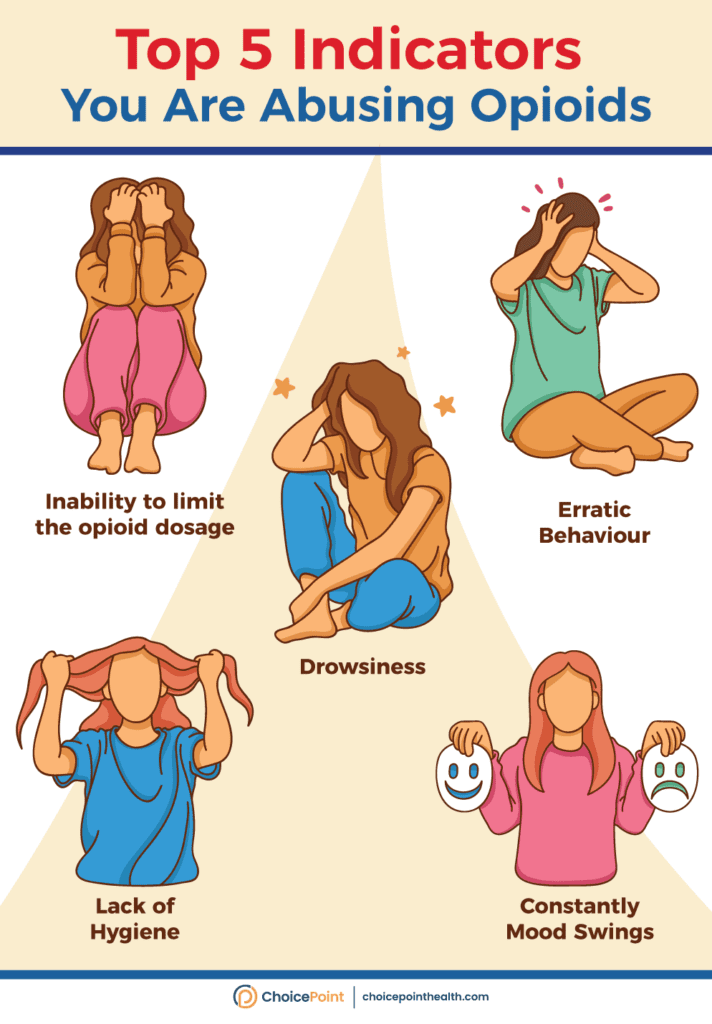
How to Spot Signs of Opioid Addiction?
Reclaim Your Life After Successful Opioid Addiction Treatment Near You
Opioid addiction can be a tough battle to fight. If you already have struggled with substance abuse in the past and came out victorious, you’re very close to the victory line, but not yet there! One brutal aspect of opioid addiction is the amount of time a person loses to both drugs and rehabilitation. A substantial amount and resources are spent additionally to power through the withdrawal and rehabilitation phase.
Here are three things a person with a history of substance abuse can do to get back on track:
1. Find Yourself Some Sustainable Hobbies
Hobbies are a great way to spend some time with yourself and explore your potential. We are all born with our customizable personality types and will inevitably have distinct hobbies and interests. Whether your hobbies include writing, reading, painting, or learning a language, these are surefire ways to engage yourself in a self-developmental process. Plus, exploring your hobbies will help with the common depressive thoughts after substance abuse.
2. Strengthen Your Social Circles
People who fall into drug addictions cut off their social contacts. It is one of the criteria for identifying the ‘stage of addiction (5th and final stage). Thus, reclaiming your life will challenge getting back together or building a new social life altogether. A healthy life involves a healthy social presence without which most individuals, especially those struggling with substance abuse, cannot adequately function. Go out with your loved ones. Stay fresh!
3. Work
Human beings need a purpose to live or even to survive. After substance abuse’s devastating impact on a person’s life, resources and finances can dry out. Patients can often find themselves dependent on others for care and survival. Therefore, a holistic approach will require you to get back on your feet and learn to be independent again. This will require baby steps, so don’t be hard on yourself, but start somewhere!
Recover Through ChoicePoint: An Opioid Treatment Program Near You
ChoicePoint is an addiction treatment center that provides individualized treatment plans according to a patient’s needs. Here are the top 5 reasons why you should consider ChoicePoint for Opioid addiction treatment:
- ChoicePoint provides medical detox to help rid the body of all the toxins before moving on to the next steps of treatment. Don’t let the stigma associated with addiction treatment stop you from scheduling an in-person with our DEA-certified doctors, as we honor doctor-patient confidentiality.
- Our doctors offer FDA-approved MAT programs. We use Buprenorphine®, Naltrexone®, and Suboxone® to ease withdrawal symptoms and treat opioid addiction.
- ChoicePoint is also a Telehealth clinic that can offer you or your loved ones an effective opioid addiction treatment that doesn’t require visiting the clinic. Our doctors are constantly accessible with a single click and offer continuous assistance.
- ChoicePoint accepts all insurances, including Medicare and Medicaid, to make you feel comfortable.
- ChoicePoint offers dual diagnosis treatment for people suffering from co-occurring disorders. To assist you in leading a drug-free life, our addiction therapists use CBT and DBT along with medication as a treatment therapy for addiction.
If you or a loved one is struggling with opioid addiction, you don’t need to fight alone. The doctors at ChoicePoint are standing by to get you started on the road to recovery today.
Why You Need to Look for An Opioid Treatment Program Near You!
136 people die from opioid abuse every day. Addictions are not formed in one day and cannot be cured in one day. Most opioid abusers don’t consider the possibility of choosing an addiction treatment program to get sober. However, it is estimated that around 41% of people seeking medical assistance for opioid addiction and complete treatment achieve abstinence. The goal of opioid treatment programs near you is to remove toxins from the body and teach you how to control your cravings for opioids. Don’t hesitate to ask for help; simply contact ChoicePoint at 844.445.2563 and schedule your appointment today.
Medical Disclaimer:
ChoicePoint aims to improve the quality of life for people struggling with substance use disorder and mental health issues. Our team of licensed medical professionals research, edit and review the content before publishing. However, this information is not intended to be a substitute for professional medical advice, diagnosis, or treatment. For medical advice please consult your physicians or ChoicePoint's qualified staff.

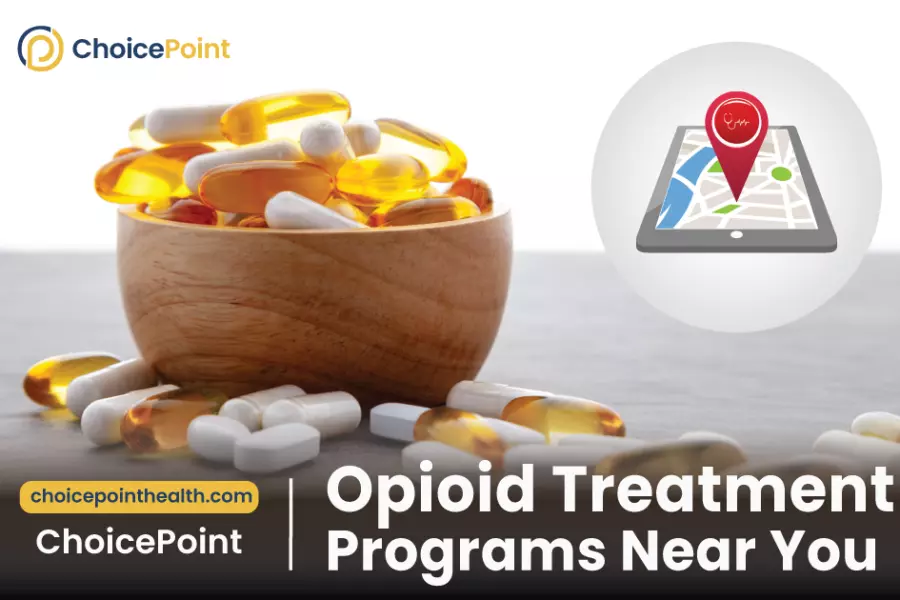

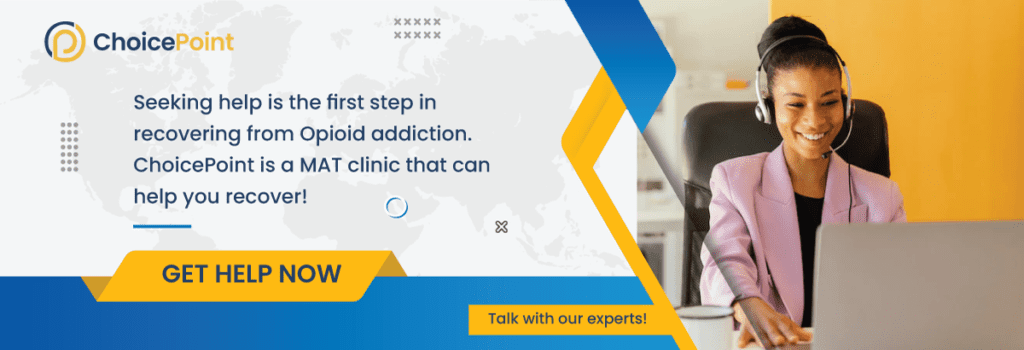






Review Opioid Treatment Programs Near You – A Quick Guide.